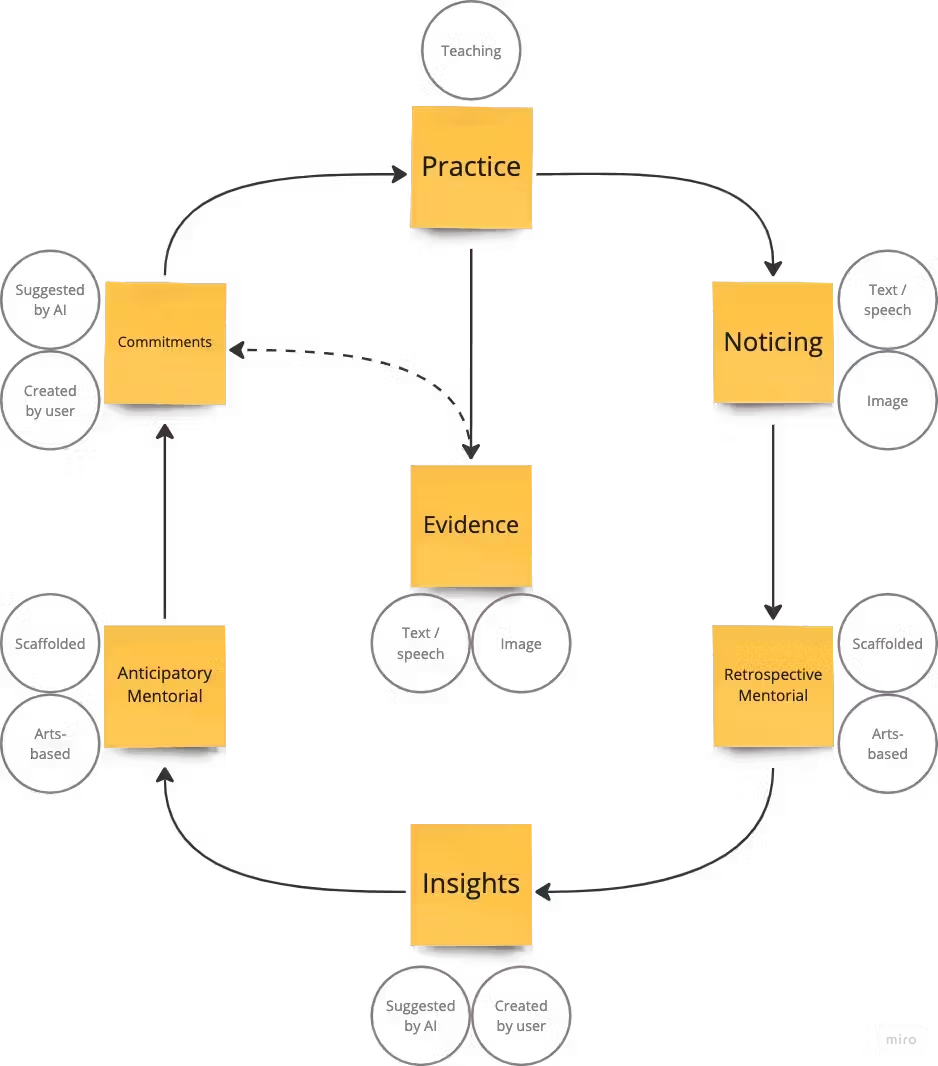
Our reflective cycle
Posted on 4th January 2024 by Elena Oncevska AgerOur reflective cycle is influenced by Kolb’s (1984) Experiential Learning model of reflection in that it allows experience to interrogate our ever-evolving professional knowledge (see illustration below).

Noticing
The cycle starts by drawing on teachers’ recent practical experiences of teaching. The users first create their own ‘noticings’, i.e. brief descriptions of moments that stood out for them for some reason, using text, speech or image. Noticings are quick and easy to create, and can be done in the moment or later on, but with an emphasis on capturing the essence of the moment whenever it hits the teacher.
Reflection
These noticings are stored for when the teacher is ready to review them and select which noticing(s) they would like to reflect on in greater detail by starting a retrospective mentorial, focusing on a past episode.
This can be scaffolded (using the five steps of the Systematic Informed Reflective Practice model , which is mostly retrospective) or arts-based, using AI generated photos, but to name a couple of possibilities.
Following a retrospective mentorial, the app automatically generates a summary, which the teacher can choose to share e.g. with their real-life mentor. Of course, it is likely that the use of the app is supplemental to a more standard mentoring practice, and the the teacher and their mentor may well use these app mentorials as the basis for their mentoring conversations.
Insights
The app then automatically generates suggested insights and commitments (see below), i.e. moments of realisation; it is well suited in doing so as it very efficiently extracts intent and sentiment from text. The teacher then reviews these, as well as having the opportunity to write anything that has occurred to them.
Choosing an insight to reflect more deeply on, the teacher can do an anticipatory mentorial, focusing on developing an alternative plan of action in a similar future scenario. The author is supported to craft a detailed plan, which they can also explore from the position of someone else in the scenario, thus tapping into empathy. This mentorial type can also be scaffolded or arts-based, and a shareable summary is automatically generated.
Commitments
As a follow-up to an anticipatory mentorial, the app automatically suggests commitments, i.e. aspects that the teacher may want to work on going forward. As with the insights, the commitments can be deleted or edited, as well as new being created.
The teacher then goes away to act on their commitments in the context of their teaching. The cycle completes with the teacher attaching evidence of commitments being fulfilled, by using text, speech or image.
All the while, the teacher creates new noticings. When they feel a reflective cycle around one noticing has been closed and they are ready to move on to new learning, they choose to work with another noticing and another cycle commences.
Written by Elena Oncevska Ager
Written by Elena Oncevska Ager
Elena Oncevska Ager is Full Professor in Applied Linguistics at Ss Cyril and Methodius University
in Skopje, North Macedonia.
Her work involves teaching English for Academic Purposes (EAP) and supporting the development of English
language teachers, in face-to-face and online contexts. Her research interests revolve around EAP and
language teacher education, with a focus on mentoring, group dynamics, motivation, learner/teacher
autonomy and wellbeing.
Elena is particularly interested in facilitating reflective practice, in its many forms, including
through using the arts and by using AI to facilitate it. Her investigations are designed in such a way
as to inform her practice of supporting learning and teaching.